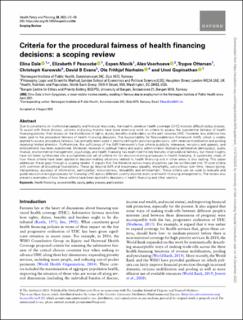| dc.description.abstract | Due to constraints on institutional capacity and financial resources, the road to universal health coverage (UHC) involves difficult policy choices. To assist with these choices, scholars and policy makers have done extensive work on criteria to assess the substantive fairness of health financing policies: their impact on the distribution of rights, duties, benefits and burdens on the path towards UHC. However, less attention has been paid to the procedural fairness of health financing decisions. The Accountability for Reasonableness Framework (A4R), which is widely applied to assess procedural fairness, has primarily been used in priority-setting for purchasing decisions, with revenue mobilization and pooling receiving limited attention. Furthermore, the sufficiency of the A4R framework’s four criteria (publicity, relevance, revisions and appeals, and enforcement) has been questioned. Moreover, research in political theory and public administration (including deliberative democracy), public finance, environmental management, psychology, and health financing has examined the key features of procedural fairness, but these insights have not been synthesized into a comprehensive set of criteria for fair decision-making processes in health financing. A systematic study of how these criteria have been applied in decision-making situations related to health financing and in other areas is also lacking. This paper addresses these gaps through a scoping review. It argues that the literature across many disciplines can be synthesized into 10 core criteria with common philosophical foundations. These go beyond A4R and encompass equality, impartiality, consistency over time, reason-giving, transparency, accuracy of information, participation, inclusiveness, revisability and enforcement. These criteria can be used to evaluate and guide decision-making processes for financing UHC across different country income levels and health financing arrangements. The review also presents examples of how these criteria have been applied to decisions in health financing and other sectors. | en_US |

